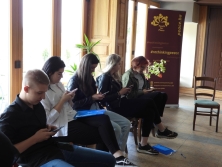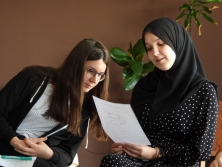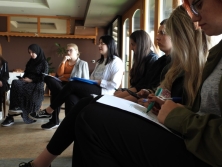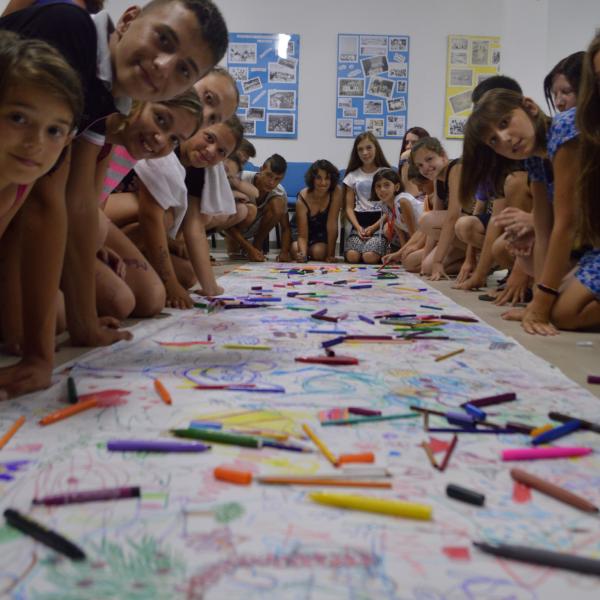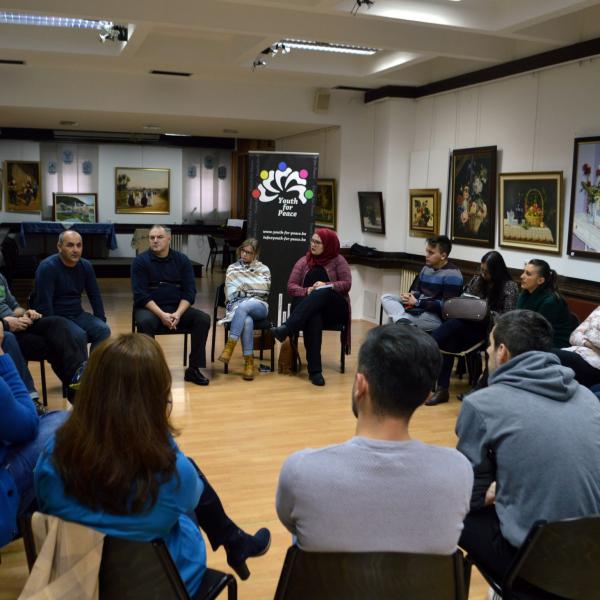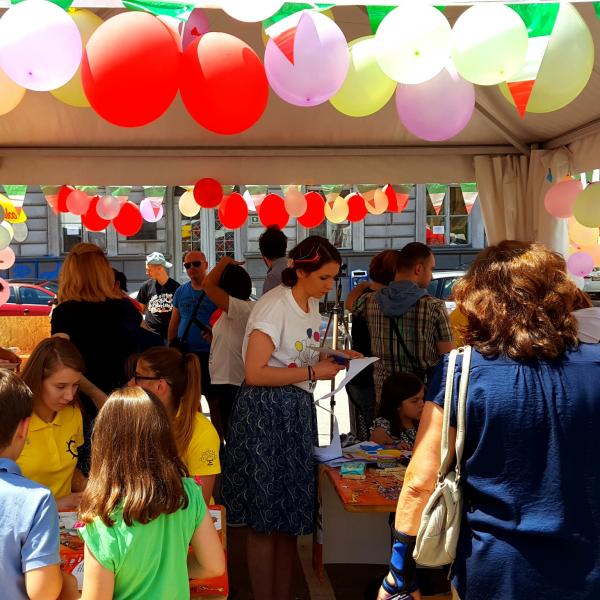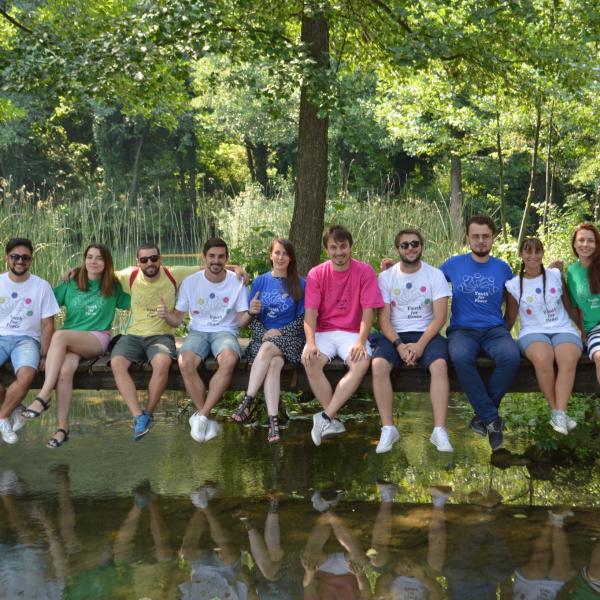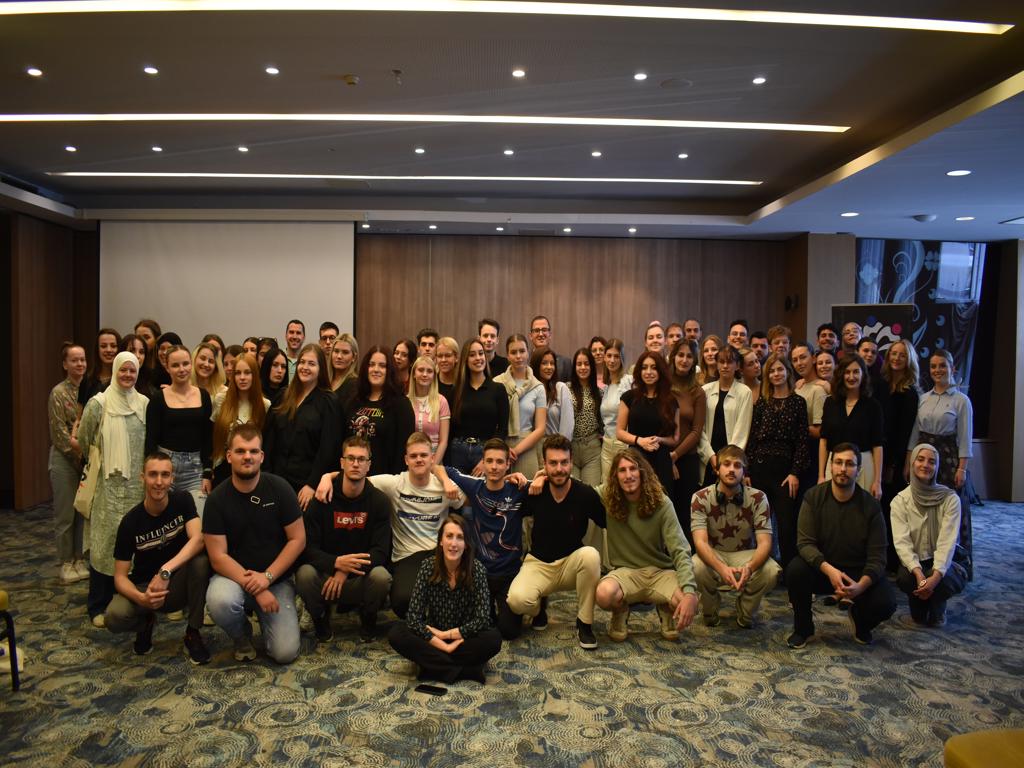
From May 9 to 11, 2025, the Active Youth Forum was held in Sarajevo, bringing together over 70 young participants from across Bosnia and Herzegovina. The forum's main theme was youth public advocacy, aiming to empower young people to actively engage in driving social change. Over the course of three days, participants had the opportunity to learn from leading experts in the field. Ilija Trninić, an advocacy expert, introduced the basics of advocacy and its key steps. Katarina Vučković, Program Manager at the War Childhood Museum, led a workshop on identifying target audiences and allies, while Dženana Alađuz, Director of the INFOHOUSE Foundation, focused on effective communication in advocacy processes. A valuable contribution to the Forum came from representatives of the partner organisation NIT – Bryan Carey and Mirela Popaja-Hadžić, who held a workshop on gaining allies for advocacy initiatives. The Forum also had an international component, featuring guests from the Romanian organisation Polylogos, who shared their experiences from previous editions of the Active Youth Forum held in Romania.


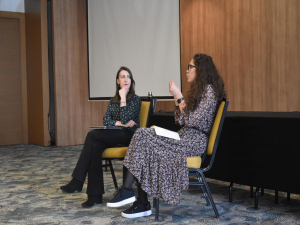
In addition to workshops, the program included inspiring talks with key figures from the public and civil sectors. Belmin Zukan, a member of the Parliament of the Federation of Bosnia and Herzegovina, spoke about the role of young people in political decision-making. Amila Čengić, youth worker and former Project Coordinator of the Youth Council of the Federation of Bosnia and Herzegovina, shared her insights on youth engagement and activism. After the Forum, participants will continue working on their advocacy initiatives with mentoring support from Youth for Peace and NIT. The most active participants will have the opportunity to travel to Brussels, where they will connect with peers from Romania and Italy to present the outcomes of their work and their advocacy ideas.
The ASPYRE EUROPE project is coordinated by the organisation Polylogos (Romania) and is implemented in cooperation with partners Cooperativa Agorà (Italy), as well as Youth for Peace and Nit (Bosnia and Herzegovina). ASPYRE EUROPE is funded by the European Union. Views and opinions expressed are, however, those of the author(s) only and do not necessarily reflect those of the European Union or the European Education and Culture Executive Agency. Neither the European Union nor the granting authority can be held responsible for them.

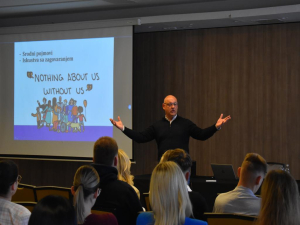
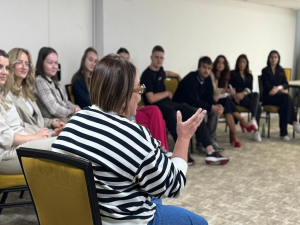
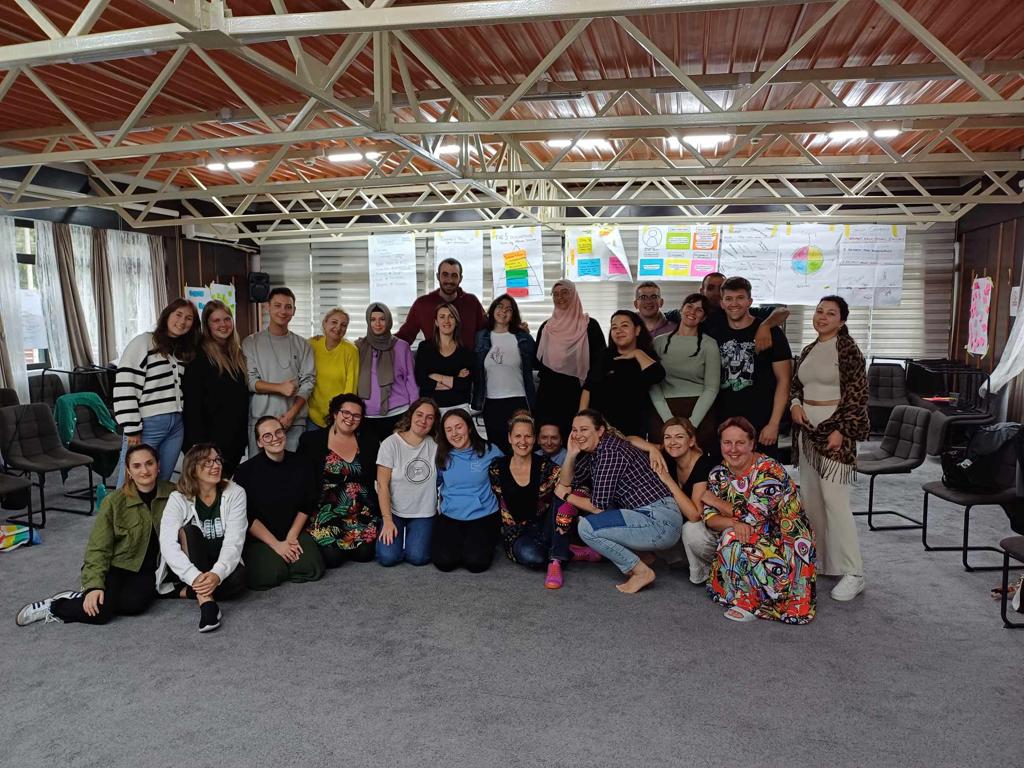
From September 22nd to October 1st, Sombor Education Center organized the Erasmus+ training "May the group force be with you(th)!". The training was attended by youth workers, youth leaders and youth coordinators from seven countries: Serbia, Bosnia and Herzegovina, Estonia, Poland, Croatia, Kosovo and Turkey. During the training, the participants had the opportunity to exchange experiences and learn more about tools and methods of working with different groups, resolving group conflicts, crisis management, and ways of motivating groups with which we work long-term on a specific topic. The participants had the opportunity to apply all learned methods and tools in practice during the training.
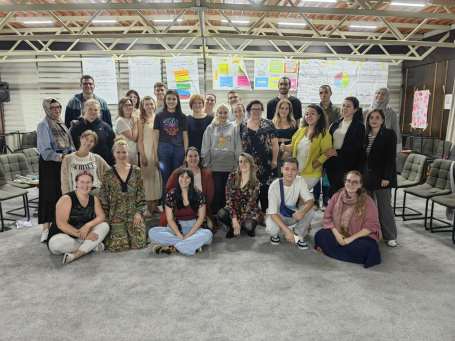

One of the sessions was dedicated to presenting the experiences of associations and organizations that work with young people in the long term. At this session, the panellists were Dejan Đorđić, on behalf of the Centar za pedagoške inicijative, Ivana Barać on behalf of the Sombor Education Center, Jelena Karać on behalf of the Omladinski savez udruženja OPENS and Ivana Novaković, on behalf of the National Association of Practitioners of Youth Work. During the training, the participants, with the help of trainers and organizers, created a manual containing methods and tools useful to all professionals, youth workers, mentors and trainers who work with youth groups.
The project "May the group force be with you(th)!" is implemented by Sombor Edu Center in partnership with Youth for Peace from Bosnia and Herzegovina, MTÜ A Bit Better from Estonia, Fundacja Krok do Przodu from Poland, European Youth Bank from Turkey, Ocean Znanja from Croatia, and NGO THY from Kosovo. The project was supported by the Tempus Foundation and financed by the European Union through the Erasmus+ program.
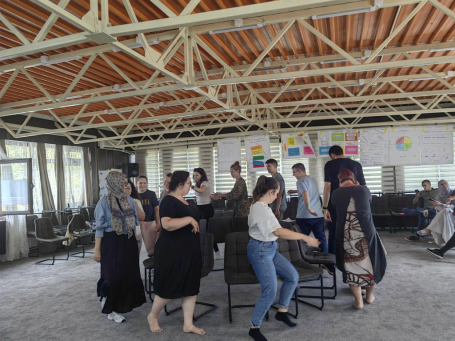

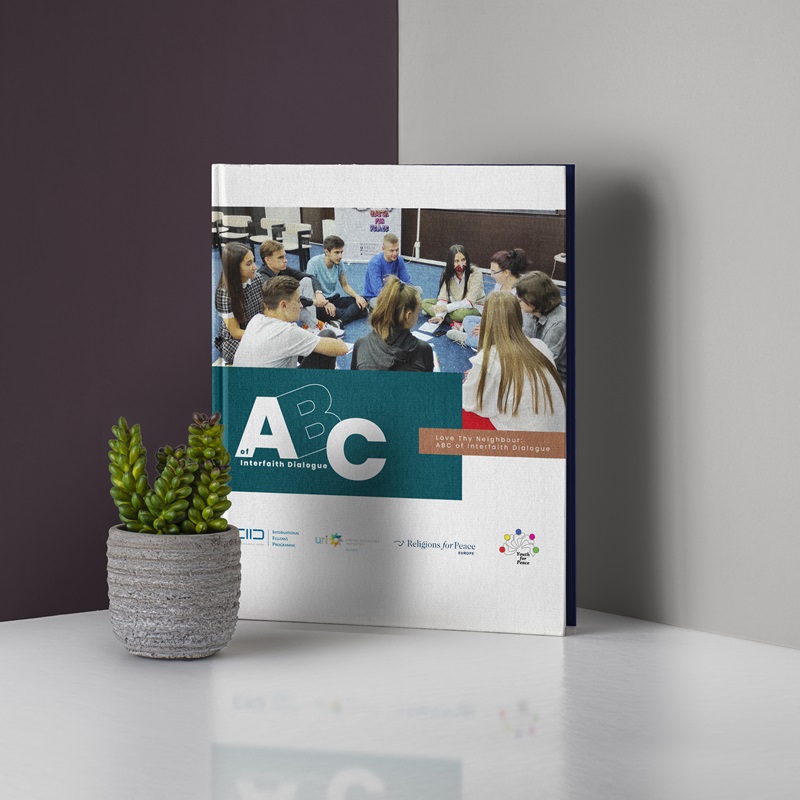
On September 5th, we launched our latest publication, the “ABC of Interfaith Dialogue,” a comprehensive guide designed to enrich and streamline interfaith dialogue. This groundbreaking resource brings together key definitions, historical milestones, influential figures, and significant dates, all essential for deepening understanding in interreligious dialogue. Available in Bosnian/Serbian/Croatian and English, this guide is invaluable for scholars, practitioners, and anyone passionate about fostering mutual respect and collaboration between diverse faith communities. This project was developed as part of the KAICIID Fellows Program in collaboration with United Religions Initiative (URI) Europe, Religions for Peace Europe, and Youth for Peace. The virtual launch event, held on Zoom, gathered esteemed colleagues and representatives from partner organizations across Europe and beyond.
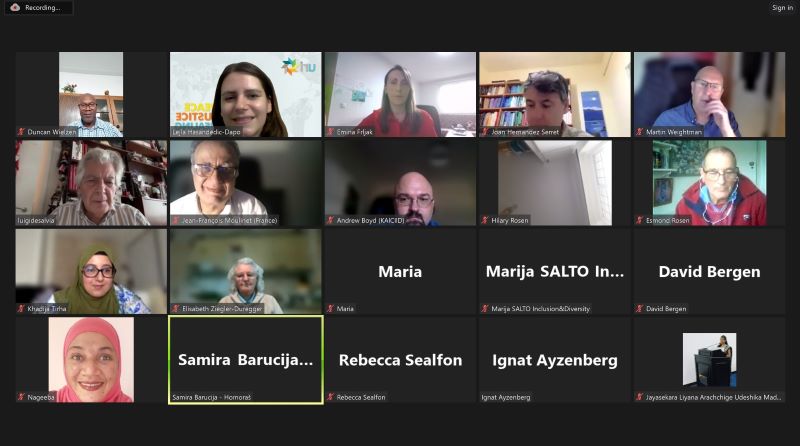
During the event, Dr. Duncan Wielzen, President of URI Europe, emphasized the publication's power to build peace and mutual understanding, stating, “This guide has incredible potential to bridge divides and promote harmony among diverse communities. I truly hope it reaches a wide audience.” Similarly, Luigi de Salvia, President of Religions for Peace Europe, praised the guide’s clarity and its critical role in advancing well-defined interreligious concepts, highlighting its significance in nurturing respect and peace between communities. Samira Baručija-Homoraš, URI Multiregion Coordinator, called upon attendees to share the publication widely, reinforcing its value as a vital resource for fostering dialogue and collaboration across faiths.
A recording of the launch event is available on the URI Europe YouTube channel: Watch here
You can access and download the publication through the following links:
BCS version: Read and download here
English version: Read and download here
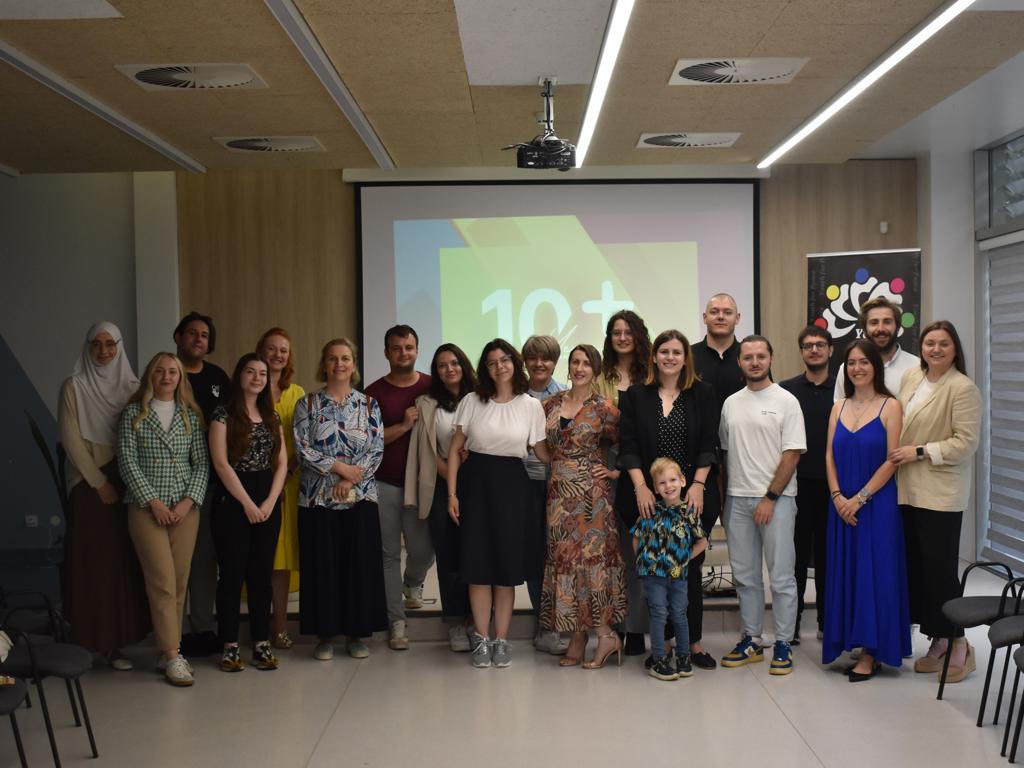
Last Friday, June 28, 2024, the 10th birthday of Youth for Peace was celebrated on the premises of the Children's Home in Grbavica. Behind Youth for Peace are 10 years filled with work and contribution to Bosnian-Herzegovinian society and, most importantly, a large number of young people who have gone through YfP educational programs. This birthday was an opportunity for members, friends, associates and partners of Youth for Peace to gather and celebrate the first decade of the Organization's existence in a pleasant atmosphere.
With a suitable program, those gathered were reminded of the most beautiful moments, successes, projects and work of the Organization in the last ten years. The host of the program was Berina Bulatović, a member of the Board of Coordinators, while Lejla Hasandedić-Đapo, one of the co-founders of Youth for Peace, Emina Frljak and Samira Fatma Baručija-Homoraš, members of the Board of Coordinators, also addressed the guests. The guests also had the opportunity to hear messages from friends and associates of YfP who come from different countries around the world. So the guests listened to the address of Maria Crespo from Argentina on behalf of the organization United Religions Initiative, Angelina Vladikova from Bulgaria on behalf of the organization Bridges, Samir Akacha on behalf of the organization Coexister from France and Matthew Youd from Wales.
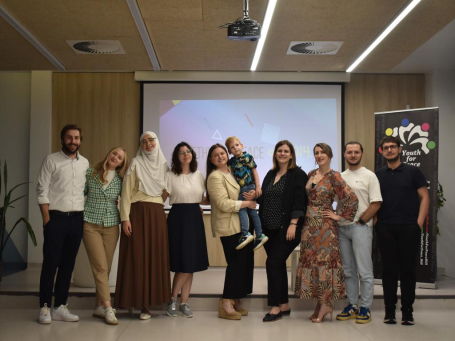

"Everything we did and everything we do is our small contribution to making this world better, more beautiful and more peaceful. Unfortunately, the situation in which the world is today shows that we have to work even harder, to invest in peace, promote peace education, learn, network and achieve partnerships with others, both in BiH and beyond. Alone we can do little, but together we can do much more. Thank you all for being here and for making this world at least a little better place with your work", said Emina Frljak in her address to the guests.
Refreshments, food and cake were served after the program. This served as an opportunity for those present to get to know each other, connect and create new partnerships for promoting and building a more peaceful Bosnian-Herzegovinian society.
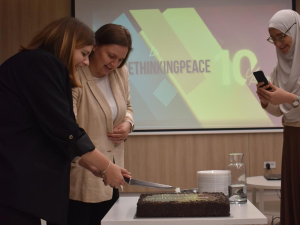
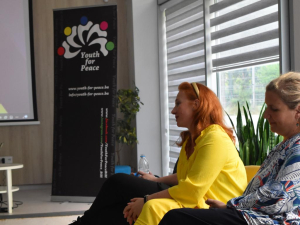

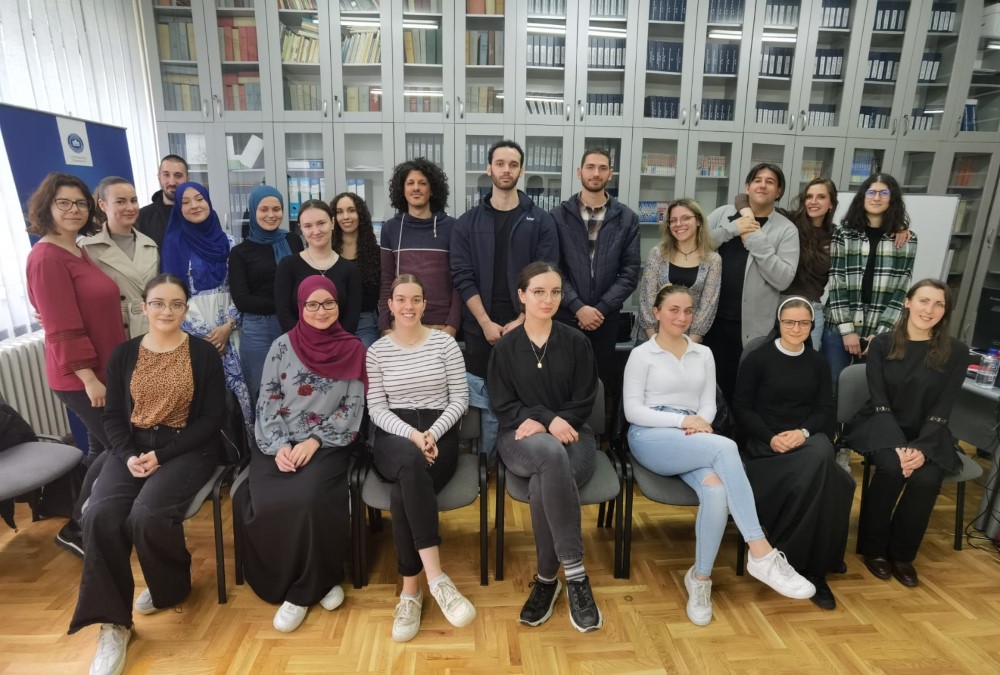
Youth for Peace, in cooperation with Peace Education Hub (Faculty of Philosophy, University of Sarajevo), held a workshop on peace education on May 16, 2023. This date is celebrated as the International Day of Living Together in Peace, so the event was an exceptional opportunity to celebrate this day and discuss how we can contribute together to peace through education. The workshop was held at the Faculty of Philosophy, University of Sarajevo. Students from the Department of Pedagogy, Department of English, and Department of History attended the workshop. Facilitators from our organization, Emina Frljak and Azra Hodžić, designed and implemented the workshop. Support during the organization and implementation of the workshop on behalf of the Center for Peace Education was provided by Prof. Ph.D. Emina Dedić Bukvić from the Department of Pedagogy.
During the workshop, the participants, through interactive exercises, had the opportunity to learn what peace education is, its contents and types, and how to make their future classrooms and workplaces peace-sensitive. The methods used during the workshop relied on methods from the peace education oeuvre, where the emphasis was on the participants, their experiences, and ideas, which they could connect with new knowledge and skills in the field of peace education.
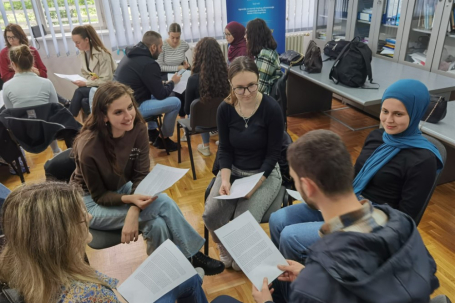
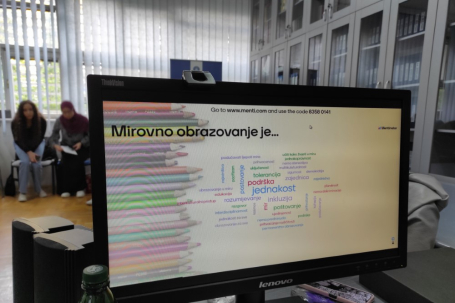
One of the workshop participants, Suzana Benković, shared with us that "peace education can be one of the initiators of changes in society, and changes in society are necessary for a society to progress. Today's workshop was precise that one, although perhaps a tiny, but no less significant change in the adoption, understanding, and later in the application of the learned knowledge through the prism of peace education".
"Having the opportunity to participate in today's workshop on peace education, I can freely say that in addition to the knowledge I had in this area so far, I also learned a lot of new things. I learned what is included in peace education and what are all the advantages of implementing peace education in schools. I also had the opportunity to learn about very interesting activities within the workshop, which I had not had the opportunity to learn about and participate in before. Our presenters, Azra and Emina, did an excellent job, and I am happy that we had the opportunity to learn from them," said Almir Bulbul, a student of pedagogy who participated in the workshop.
During the workshop, the participants showed interest in the topic, were actively involved in the conversation, connected new knowledge with their previous experiences, and presented ideas on how they, as future teachers and pedagogues, can improve the educational process and introduce methods and elements of peace education into their work. This workshop is the first joint activity that Youth for Peace and Peace Education Hub implemented together, and we hope that our cooperation in the field of peace education will continue in the future.
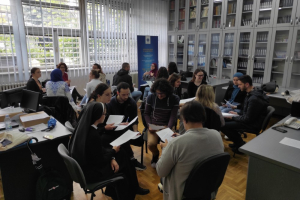
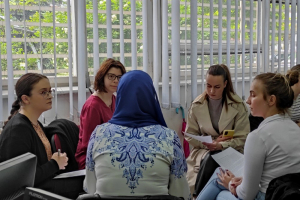
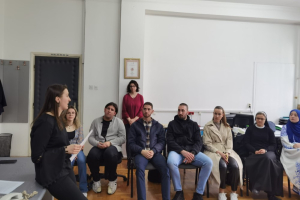
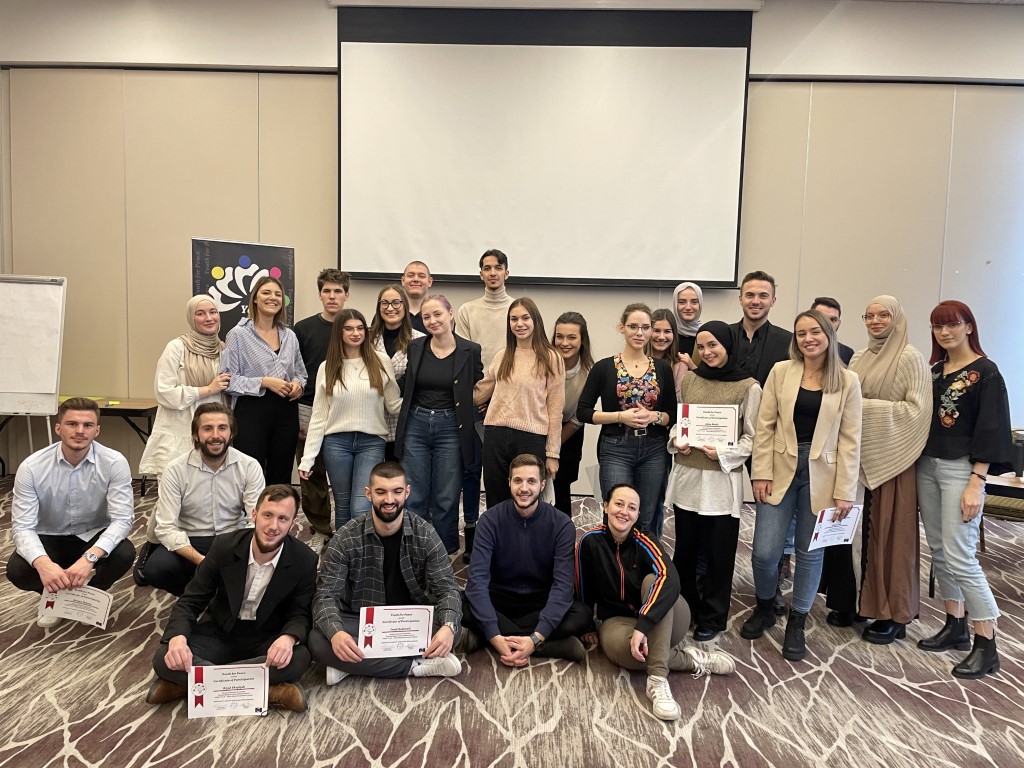
From 15th to 18th December 2022, Sarajevo was a host for the second gathering within the project Y.A.P. – Youth Advocates for Peace. As part of this meeting, training for young people who are active in civil society and work with their peers in the broader field of peacebuilding and strengthening social cohesion was held. Young people, precisely 26 of them from all over Bosnia and Herzegovina, including from Sarajevo, Banja Luka, Travnik, Zenica, Gradačac, Donji Vakuf, Tešnja, Zavidovići, Živinice and Velika Kladuša attended the training. The training was a combination of thematic and methodological approaches. The topics covered come from the area of peace education, and all topics are treated from the perspective of the Balkans and Bosnia and Herzegovina.
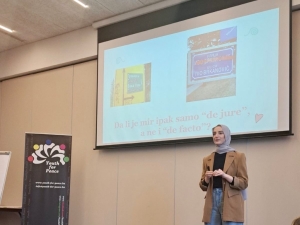
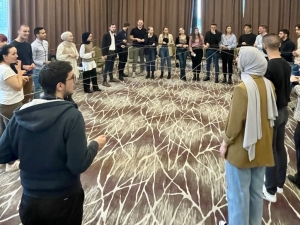
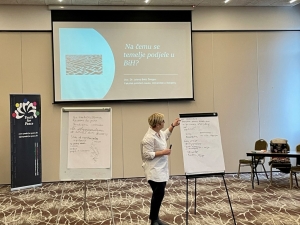
Some of the topics discussed during the training were: interreligious dialogue, the role of politics in peacebuilding, the importance of the culture of remembrance in peacebuilding, EU integration and sustainable peace in the Western Balkans, forms of political participation, how young people can participate in peacebuilding. In addition to the facilitators of the Youth for Peace organization, prof. Ph.D. Nerzuk Ćurak, prof. Ph.D. Elmir Sadiković, and assoc. Ph.D. Jelena Brkić-Šmigoc from the Faculty of Political Sciences, University of Sarajevo responded to our invitation to be the lecturers during the training. All topics covered were prepared as interactive participant-oriented workshops using peace education methods such as group work, guided discussion, dialogue method, individual work, cooperative learning, reflection, and debriefing.
Project Y.A.P. - Youth Advocates for Peace is supported by the European Youth Foundation - Council of Europe.
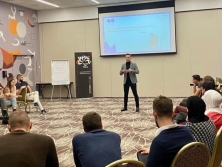
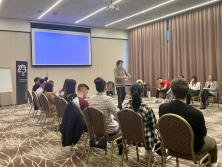
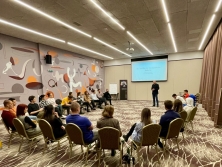
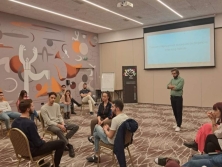
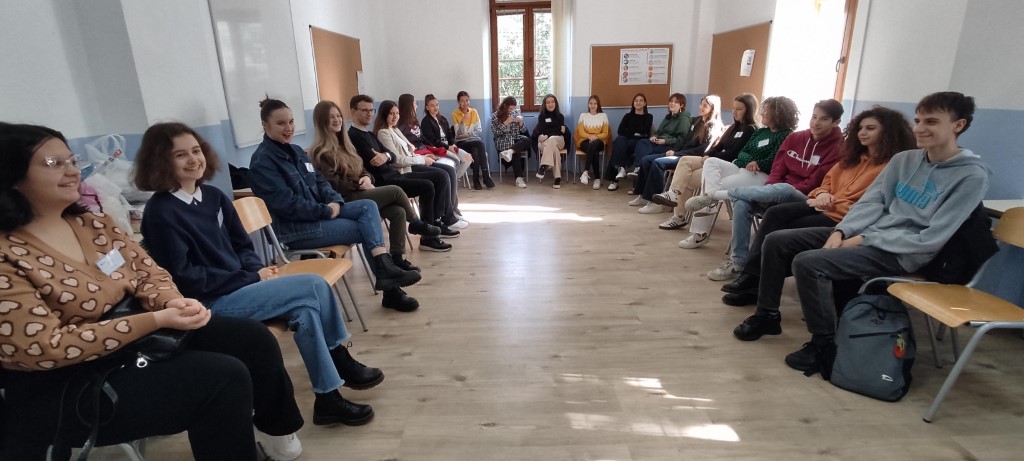
As part of the UčiMO MIR project, supported by PRO-Budućnost through the small grants program, Youth for Peace in cooperation with the Mostar Summer Youth Program (MSYP), implemented two LAB training modules for high school students, the first module on 5th and 6th November 2022, and the second on the 3rd and 4th December 2022. LAB participants are 30 students from seven high schools in Mostar. The LAB program is designed so that in the morning hours classes from physics, chemistry and biology are held, followed by practical work in the mentioned subjects. Afternoon hours are reserved for workshops. The goal of the workshops is to encourage intercultural dialogue, and the development of critical thinking among students, and to give them the opportunity to share their views on the society in which they live. LAB works according to the model of informal multi-ethnic education, where high school students from various ethnic groups learn together through workshops and practice in the field of natural sciences. Through this project, in addition to breaking down national barriers in education, young people are given opportunities to get quality practical education in the field of biology, chemistry, and physics, which they cannot currently get through the national plan and program.
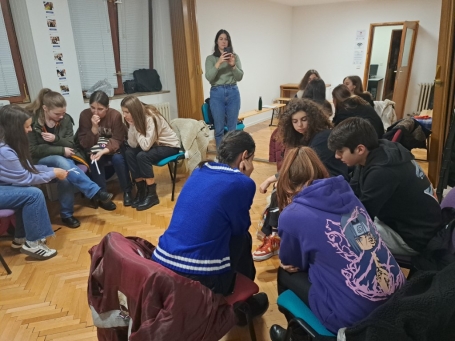
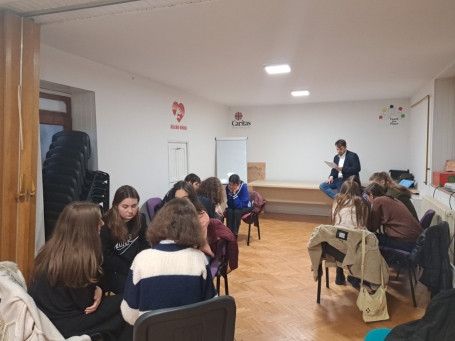
The topics of the first LAB module from the area of soft skills were: media literacy, hate speech, and identities. The approach to inter-ethnic dialogue with high school students was indirect, but the topics of identity and hate speech were directly discussed through examples from Bosnian/Herzegovinian society, as well as how hate speech and the question of identity reflect on inter-ethnic relations and tensions. By improving media literacy, young people are empowered to be more resistant to media manipulations that often serve ethnonational narratives.
As part of the second LAB, a visit to the National Museum in Sarajevo was organized and workshops on the topics of dialogue and social cohesion were held. During the workshop on dialogue and social cohesion, young people were introduced to these two concepts in the framework of peacebuilding for the first time. The definition of dialogue, as well as the difference between dialogue, discussion, and debate, were presented through group work and exercises. The dialogue as well as its basic 10 principles were contextualized both in everyday life and in the aspect of social groups, including ethnic ones. Talking about the dialogue between different social groups, the concept of social cohesion and the challenges of similarities and differences were presented to young people. This time too, participants talked about inter-ethnic dialogue, and the need to understand different and/or conflicting perspectives in building peace.
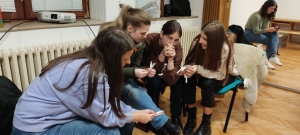
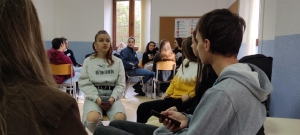
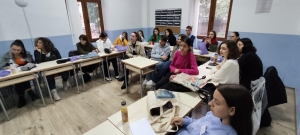
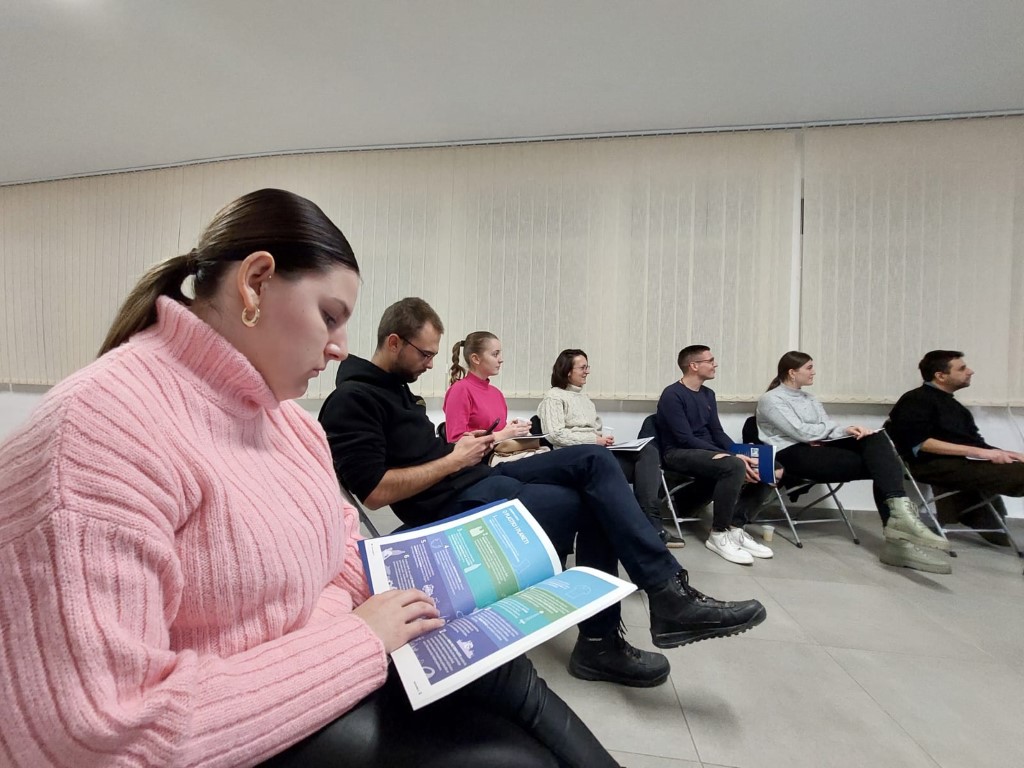
The first activity within the project PECA (Peace and Ecology Awareness), supported by URI (United Religions Initiative) was held in Banja Luka, on the 30th of November 2022. A workshop entitled "Sustainable peace and environment" gathered youth who wanted to learn more about the connections between peace and environment, as well as how they can (both individually and as part of the system) make an impact on the preservation of the environment.
This event has also been supported by the Center for Environment from Banja Luka, through the facilitation of the workshop. This organization has been implementing significant projects related to the protection of the environment and youth activism for several years now. During the workshop, young people had a chance to participate in a quiz, reflecting on their knowledge and information on environmental protection, and their own role in this process. Also, they actively discussed how peace activists are making efforts in preserving resources, which are considered to be possible reasons for future conflicts across the globe.
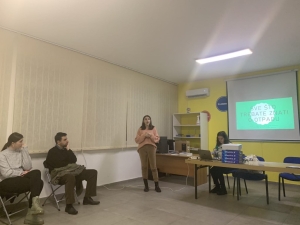
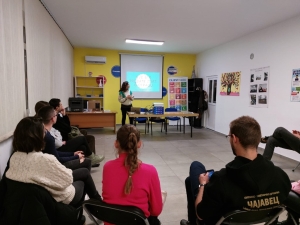
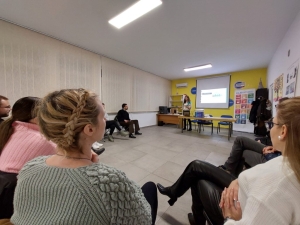
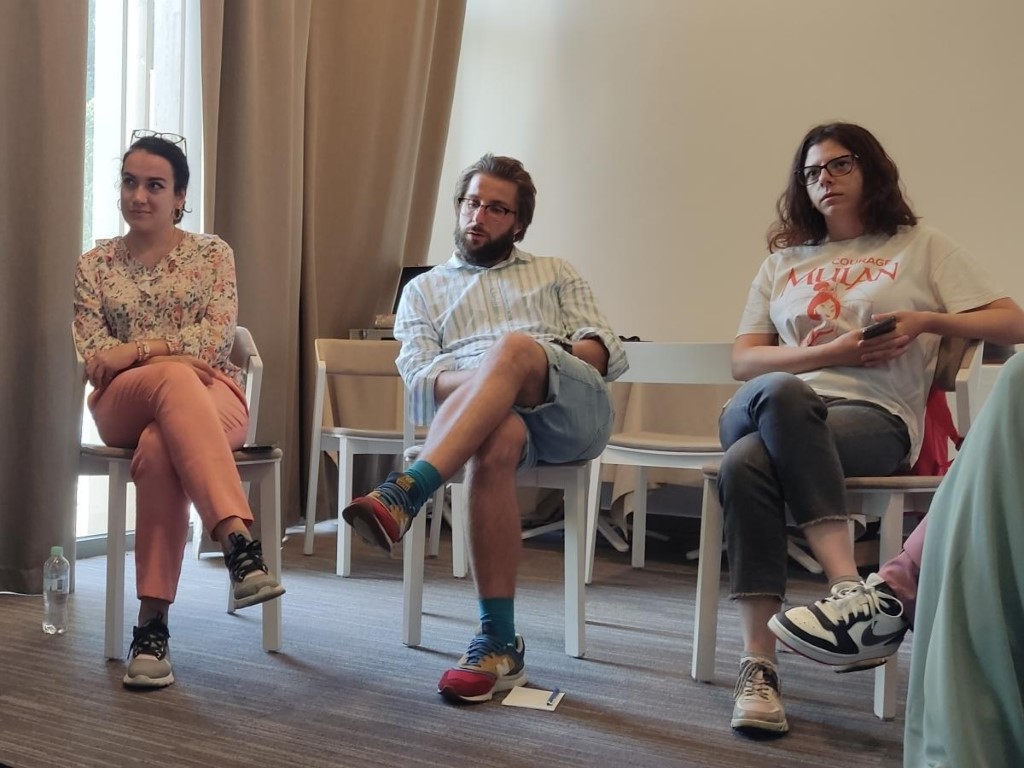
In the period from 28th to 31st of July, 2022, the first meeting within the project Y.A.P. – Youth Advocates for Peace was held at the Hotel Monti on Igman. The meeting brought together young people who are active in the civil sector and work with young people through various programs. The training included topics from the field of peace education and advocacy for peace. During the training, topics from 3 areas of education for peace were covered: Intercultural education: Identity, who we are, a plurality of identities; The role of stereotypes and prejudices in conflict and peacebuilding; Conflict resolution education: Introduction to conflict transformation: positions – interests – needs; Debate vs. dialogue - dialogue as a tool for conflict transformation; Interreligious education: Religion and peacebuilding; Religious literacy as a way forward; Interreligious dialogue as a tool for conflict transformation and the path to peace.
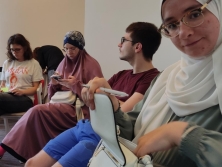
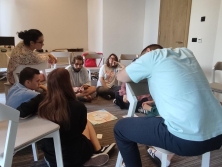
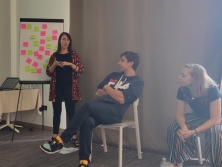
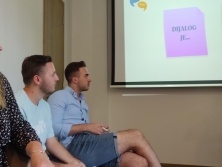
In addition to this thematic part, participants had the opportunity to learn about facilitation through meta-reflections on the workshops conducted by experienced facilitators in the field of peace education. The participants learned about specific methods and approaches used in peace education, which are necessary for the process of peace education to be complete both thematically and methodologically. In the second part of the training, participants learned about advocacy for peace and discussed what advocacy is, what methods are used in this process, how to create advocacy campaigns, and what examples of advocacy for peace are present in the world, with special emphasis on the Balkans and Bosnia and Herzegovina.
The project "Y.A.P. - Youth Advocates for Peace" is supported by the European Youth Foundation - Council of Europe. Implementation of this training is also partly supported by the Ecumenical Women's Initiative.
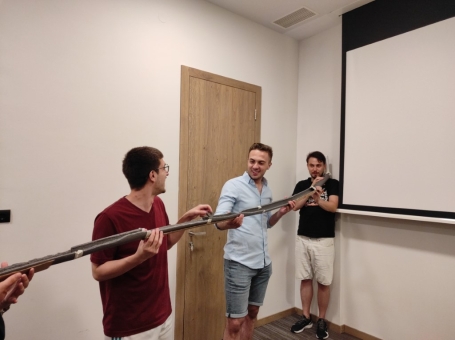
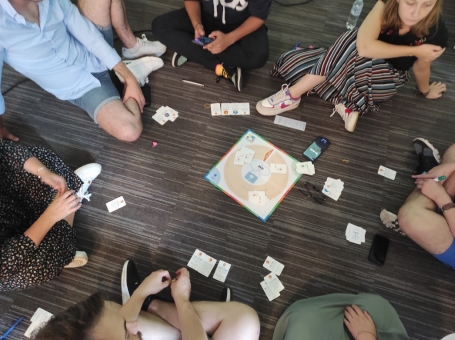
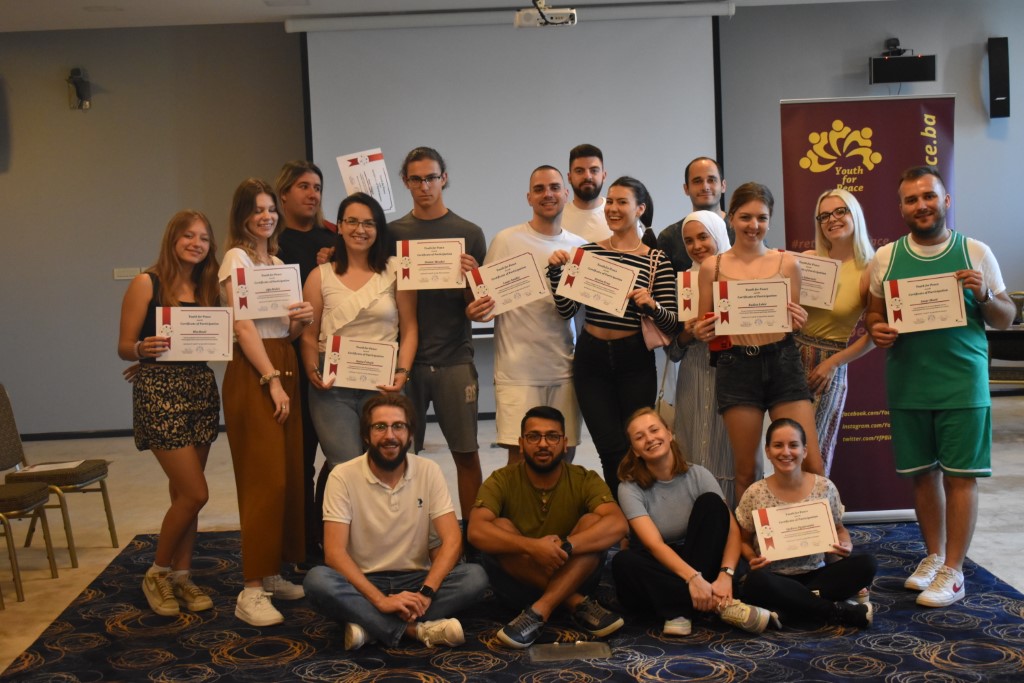
As part of the Interfaith Dialogue on Violent Extremism - iDove project, supported by GIZ, a seminar entitled "Youth against Hate Speech and Violent Extremism“ was held in Sarajevo from July 3 to July 6, 2022, which gathered 16 young people from Bosnia and Herzegovina, Montenegro, Croatia and Serbia.
During the seminar, young people had the opportunity to learn about ways to fight against violent extremism and hate speech, the importance of dialogue, as well as the impact of mental health and the media on deep-rooted social problems. In addition to interactive workshops and discussions, young people visited the City Hall and War Childhood Museum, where they learned something more about the culture and history of Sarajevo, and also expanded their knowledge of the importance and relevance of the topics discussed. Young people showed their enthusiasm for participating in the prevention of these destructive phenomena, as well as the desire to actively participate in building a society based on peace and tolerance.
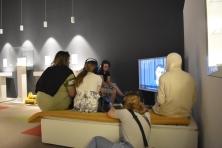
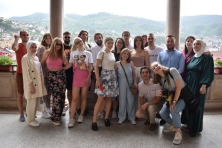
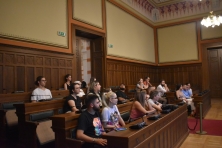
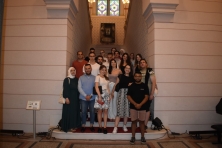
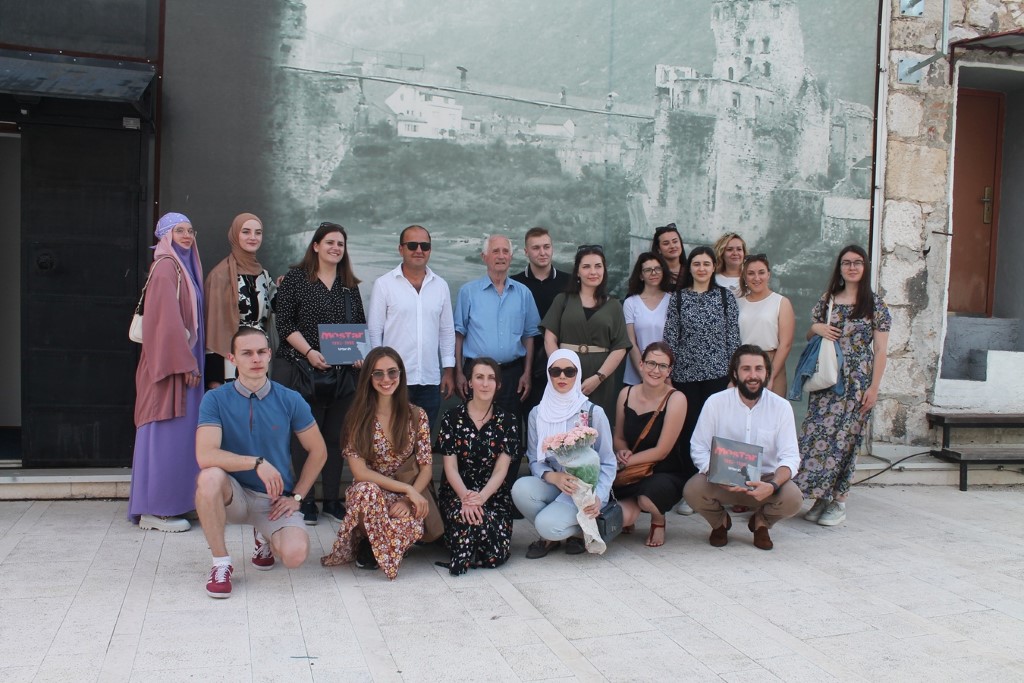
As part of the Interfaith Dialogue on Violent Extremism - iDove project, supported by GIZ, a seminar was held in Mostar from June 10th to 12th, 2022, bringing together 14 young people from various parts of Bosnia and Herzegovina. During the seminar, participants learned through educational and interactive workshops with Youth for Peace facilitators about the topics of hate speech, violent extremism, radicalization, and the importance of mental health in understanding and preventing hate speech and violent extremism, but also about positive and alternative narratives in preventing these phenomena.
Participants also had the opportunity to visit the Center for Peace and Multiethnic Cooperation. On that occasion, the hosts introduced them to the goals of the Center and the circumstances under which the center was created. In his speech, Professor Alija Vidimlić emphasized the importance of educating young people and highlighted to young people that reconciliation must be built and that we must all get involved in the fight against hate speech and violence that fill public spaces today.
After visiting the Center for Peace and Multiethnic Cooperation, young people symbolically threw flowers in the river Neretva, which was accompanied by a jump for peace from the Old Bridge. As part of the project, an online campaign "Our Imperative" is being implemented on social networks, which focuses on the fight against hate speech by creating alternative narratives aimed at young people from the region.
You can read more about the seminar and the jump for peace in these two articles: Prevencija nasilnog ekstremizma: Različitosti u BiH su naše bogatstvo and Mladi mirotvorci u Centru za mir i na Starom mostu.
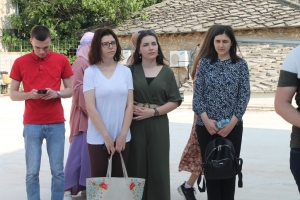
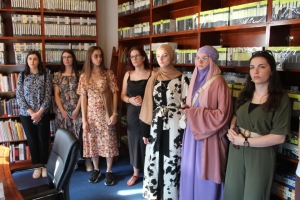
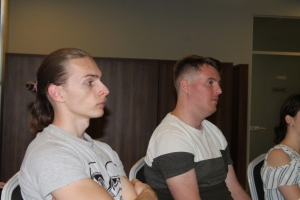
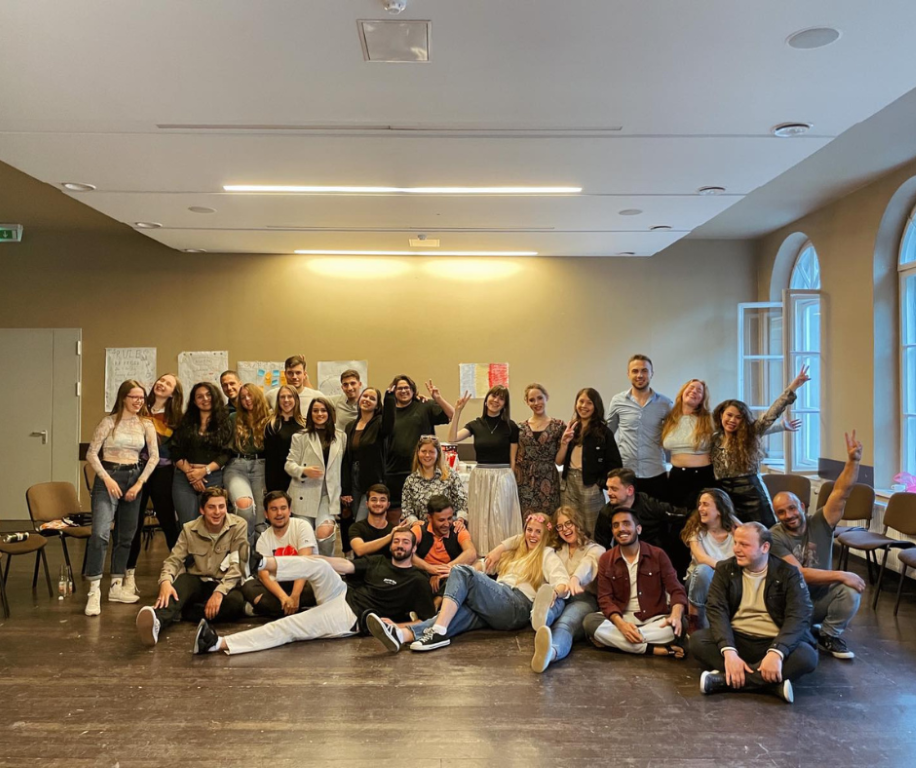
In Kaunas, Lithuania in the period from May 24th to June 1st, 2022, within the Erasmus + project, a youth exchange "Peace at War" was held, implemented by the organization "Active Youth". Bosnia and Herzegovina and our organization were represented by six participants: Belmin Delić, Damir Mahmutović, Ajla Čaušević, Nedžma Čančar, Kemal Oračević, and Lamija Ahmetagić. In addition to young people from our country, young people from Romania, Sweden, Cyprus, Georgia, and Lithuania also participated in the project.
The aim of this project was to empower young people from war-torn countries to speak, reflect and exchange views on the history of conflict in their home countries, and to share experiences about the anomalies of post-conflict societies they encounter on a daily basis. This project also focused on the acquisition of knowledge on peacebuilding, focusing on the role of young people in this process.
Participants had the opportunity to participate in a multitude of practical and dynamic workshops, with a focus on the topicality of stereotypes, prejudices, and other negative consequences of post-conflict societies. In addition, the project included getting to know different cultures, through the activity "Cultural night", a tour of Kaunas, and other interesting interactive activities for young people.
This is another successful event behind Youth for Peace from which our participants emerge with great and significant experience. The Erasmus + program enables participants to show responsibility for the customs and culture of their community, to build and show respect for the traditions and customs of other communities, as well as to raise awareness of the importance of European values on a daily basis.
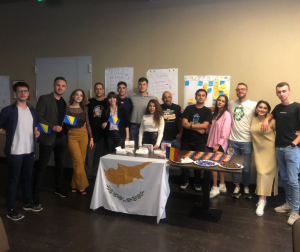
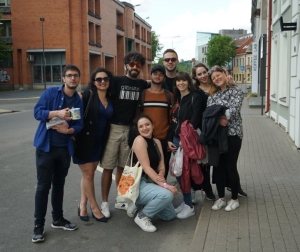
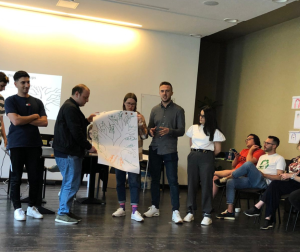
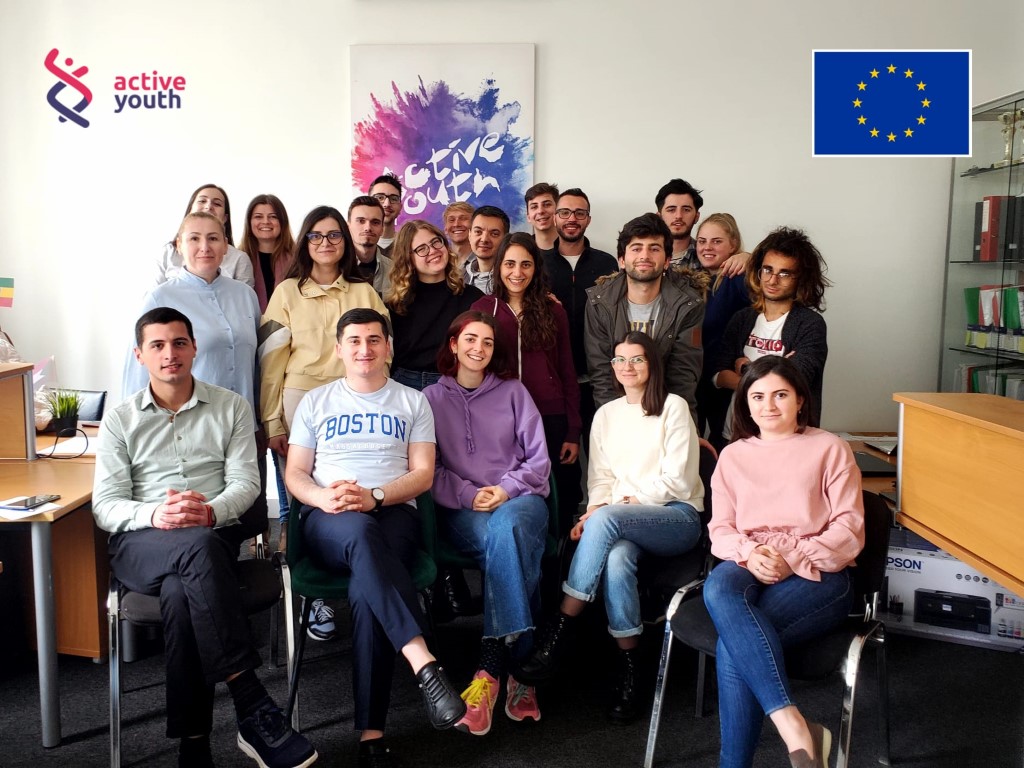
From 3rd until 12th of May, in the capital of Lithuania, an Erasmus+ training entitled Peace at War was held. Participants from Georgia, Cyprus, Sweden, Romania, Moldova, Lithuania, and Bosnia and Herzegovina gathered in Vilnius and discussed topics related to peacebuilding. Aware of the situation the whole world faces right now, it was significant for participants to exchange opinions and views and tackle current issues through mutual understanding and respect.
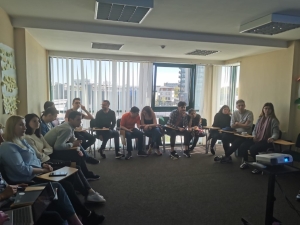
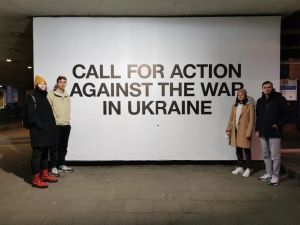
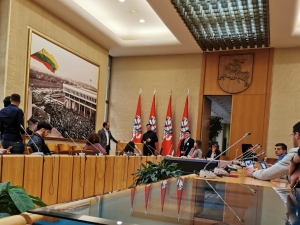
Our participants, Melina, Nasiha, Kemal, and Omer, over the course of ten days, gained knowledge in the fields of human rights, conflict management, and migration. They got familiar with the background of some of the unresolved conflicts throughout history, which consequences we can see even today. As a part of the program, they visited Lithuanian Parliament, where they met with some elected government officials, with whom they exchanged their ideas and opinions. Also, on the last day before coming home, they helped a local humanitarian center to prepare help packages for Ukrainian refugees, who are trying to get back to their everyday lives. Throughout nonformal education and networking, our members made new friendships and contacts. We are also sure that they presented our country and our organization in the best possible light.
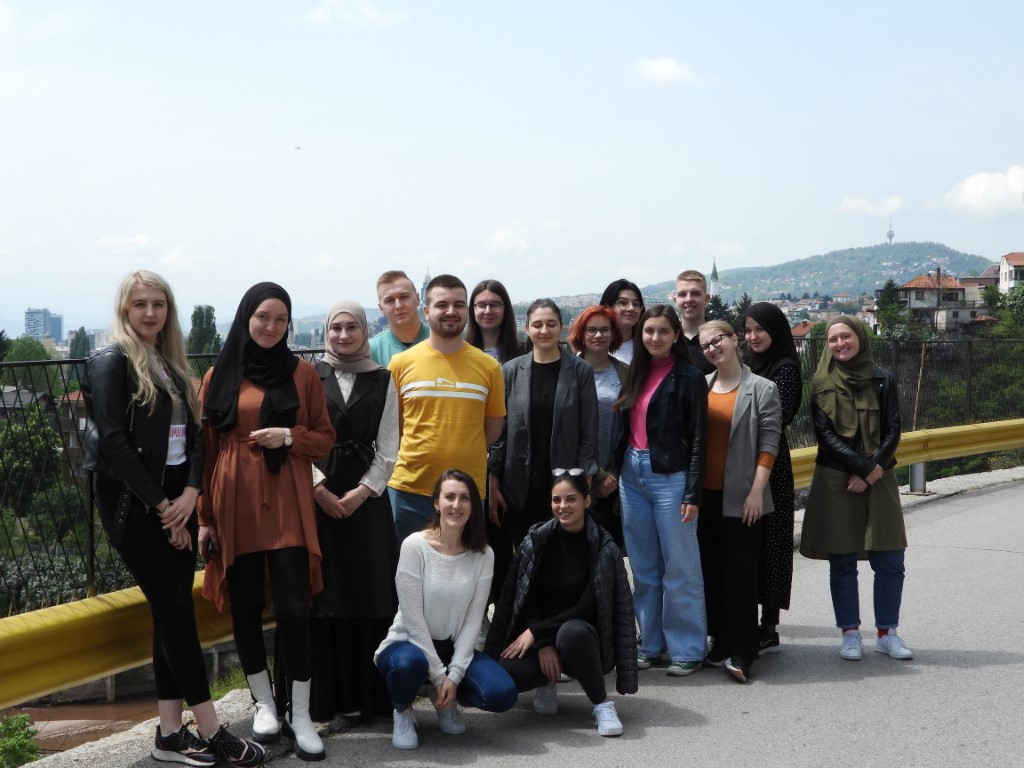
As part of the project "Through Religious Literacy to Peace", a seminar for young people was held in Sarajevo from May 5th to 8th, bringing together 15 young people from different parts of Bosnia and Herzegovina. Some of the places include Visoko, Busovača, Foča, Bijeljina, Vitez, Novi Travnik, Ključ, Brčko, Donji Vakuf, Tešanj, Pazarić, Zenica, Gračanica and Doboj.
During the four days of the seminar, participants had the opportunity to attend educational workshops held by Youth for Peace facilitators, but also to visit religious sites in Sarajevo and museums that are important for the development of interreligious dialogue and strengthening religious literacy. The tour of religious sites was followed by a reflection on what the participants saw, heard, and experienced in religious sites. In the formative part, facilitators talked with the participants about the basics of dialogue, dialogue in practice, basics of peacebuilding, the connection of religion with peace, violence, and conflict, what is interreligious dialogue, and what religious literacy means, and how we develop and strengthen it.
All workshops were interactive with a participant-oriented approach and encouraged dialogue and involvement of participants in the whole process. Participants were also able to try out what dialogue looks like in practice through the interactive social game "Dialogo" developed by the KAICIID Dialogue Center. During the reflection, the participants expressed great satisfaction with this game and emphasized that in a simple, fun, and interesting way they managed to talk through dialogue about very serious topics that are not always easy to have a conversation about based on the principles of dialogue.
This seminar is just one of the activities of the project "Through religious literacy to peace" which Youth for Peace is implementing with the support of the Ecumenical Women's Initiative from Omiš. In addition to the seminar, the project envisages the development of a manual on facilitating topics of interreligious dialogue and religious literacy with young people and running an Instagram channel through which young people can develop skills of interreligious dialogue and religious literacy in a simple, fun and educational way. The Instagram account has been active for 2 months under the name Religioskop and the activity on the account will continue after the end of the project.
